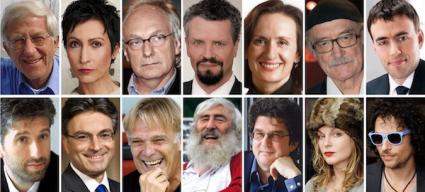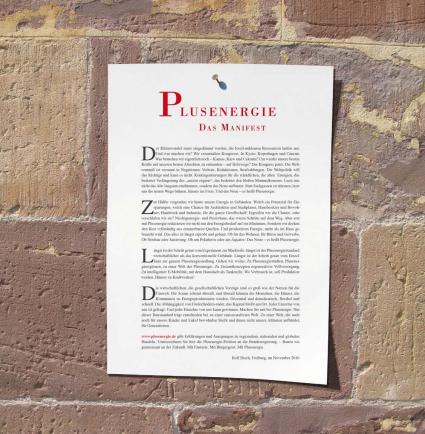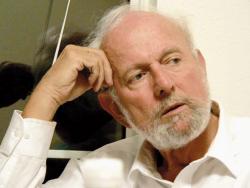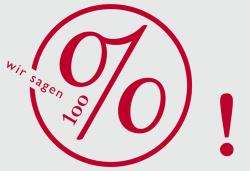Study Climate Neutral City of Lörrach
2002 Lörrach became the first German municipality to be awarded the Swiss label Energiestadt®, 2010 the city has even succeeded in getting the European Energy Award Gold. Now, sustainable development must be continually reinforced in a holistic approach. Against this background, the city of Lörrach participated in the "Climate Neutral Municipality" program initiated by the State of Baden-Württemberg and was one of the winners to be granted the financial means to create a strategic basis for future decision making.
For this purpose, Rolf Disch Solar Architecture and k.Group Munich were commissioned to write a report not only on the status quo and general scenarios for energy efficiency and energy generation, for buildings, transport and industry, showing the existing potential, but they have also already come up with concrete action proposals for projects and for the integration of different local actors.
In summary, these are the main findings:
The ambitious goal of climate neutrality can be achieved.
Due to the urban structure, generation from renewable energies is typically limited by a lack of spatial resources.
An economically viable self-sufficiency in renewable heat supply is possible through regional cooperation.
The heat demand can be reduced to between 370 and 185 GWh, which means a reduction by between 38% and 69%.
The potential of local heat generation is at about 60 GWh in 2010, 130 GWh could be achieved by 2050, technically even 500 GWh would be possible.
An economically viable self-sufficiency in renewable electricity supply is possible with consistent use of external investment opportunities.
The electric power demand for the City of Lörrach in 2050 is at between 215 and 140 GWh, which means a reduction by between 11 and 42%.
The potential of local power generation of all renewable energy types is presently at 17 GWh. By 2050, 85 GWh could be realistically achieved, 225 GWh would be technically possible. The coverage ratio in 2015 could thus go up to 62%.
Capital expenditures for full reconstruction of the critical systems of energy supply and space heating in 2050 amount to € 900 million. This is offset by efficiency gains from reduced electricity and heat requirements of approximately € 570 million. Thus, the total net investment for the entire system change would be € 330 million.
The average annual net investment would be at approximately € 8 million, or 170 € per citizen per year.
Please find the full text of the report here for download.
Please find the full (german) text of the report here for download.
2002 Lörrach became the first German municipality to be awarded the Swiss label Energiestadt®, 2010 the city has even succeeded in getting the European Energy Award Gold. Now, sustainable development must be continually reinforced in a holistic approach. Against this background, the city of Lörrach participated in the "Climate Neutral Municipality" program initiated by the State of Baden-Württemberg and was one of the winners to be granted the financial means to create a strategic basis for future decision making.
For this purpose, Rolf Disch Solar Architecture and k.Group Munich were commissioned to write a report not only on the status quo and general scenarios for energy efficiency and energy generation, for buildings, transport and industry, showing the existing potential, but they have also already come up with concrete action proposals for projects and for the integration of different local actors.
In summary, these are the main findings:
Please find the full text of the report here for download.
Please find the full (german) text of the report here for download.
▲ to top
► www.plusenergiehaus.de
Plusenergy Petition
In 2011 Rolf Disch wrote a petition to the Federal Chancellor Angela Merkel to promote the plusenergy standard. Among the first to sign the petition were politicians, activists, scientists, artists and entrepreneurs such as Franz Alt, Renan Demirkan, Claus Leggewie, Gernot Erler, Irene Fischer, Hans W. Geißendörfer, Nils Schmid, Boris Palmer, Dieter Salomon, Volker Finke, Michael Sladek, Alfred Ritter, Inga Humpe and Tommi Eckart. Meanwhile, a support program for energy-plus houses has been established by the government ...

This is the text of the petition
Dear Chancellor Dr. Angela Merkel,
Dear Federal Ministers,
Dear Chairpersons of the parliamentary groups,
A faster and more complete change from fossil and nuclear fuels to renewable energy sources is essential. For this purpose, our cities and buildings have to become much more energy efficient and fully exploit the huge potential of renewable energies. We need to concentrate on the best standard for new construction and refurbishments of buildings, the plusenergy standard, because only with the plusenergy standard consumption is reduced to a minimum and at the same time a surplus of clean energy is generated by the building itself.
Therefore, the government and parliament must make the following decisions
1 Plusenergy must become standard in new construction as soon as possible.
2 The rate of energetic building refurbishment must be increased from currently 1 percent to at least 3 percent.
3 The plusenergy standard must get the highest rank in incentive programs for new construction and renovation and be reinforced by low-interest loans.
The reasons
1 We still consume more than 50 percent of our energy constructing and using our buildings – but there are great chances to reduce this share significantly. If we want to exploit this huge potential to achieve our climate protection goals, we must not only act quickly, but at the same time use the best of available technologies. The best technology for buildings is available in the plusenergy concept on a fully developed level.
2 With the European Building Performance Directive (EPBD 2010) it is already set by statute that from 2020, all new buildings must be zero-emission houses with regenerative energy supply. Germany must already fully implement and further develop what we will be obliged to do anyway through resource scarcity and climate change. Only thus we maintain our technical lead and fulfill our responsibility.
3 Economically, plusenergy is more viable both for the investor and for society than less ambitious solutions. Nevertheless, government incentives are needed to overcome the obstacle of the slightly higher initial costs and of general inertia.
4 Of all the mitigation measures the largest effects on future investment and jobs are expected in the field of construction and renovation. With the additional tax revenue resulting therefrom support measures can be easily financed.
5 In harmony with many other measures, plusenergy is the decisive contribution to climate protection and resource conservation. The outflow of capital to the countries producing fossil-nuclear energy sources will stop, while the energetic self-determination of people, communities and regions in Germany will grow. Thus, we achieve steadily secure and affordable energy supply and an economic order of intergenerational equity.
For more information about the plusenergy petition please visit
- the petition website www.plusenergie.de and
- download the brochure (pdf in German)..
Plusenergy Petition
In 2011 Rolf Disch wrote a petition to the Federal Chancellor Angela Merkel to promote the plusenergy standard. Among the first to sign the petition were politicians, activists, scientists, artists and entrepreneurs such as Franz Alt, Renan Demirkan, Claus Leggewie, Gernot Erler, Irene Fischer, Hans W. Geißendörfer, Nils Schmid, Boris Palmer, Dieter Salomon, Volker Finke, Michael Sladek, Alfred Ritter, Inga Humpe and Tommi Eckart. Meanwhile, a support program for energy-plus houses has been established by the government ...

Some supporters of the petition
This is the text of the petition
Dear Chancellor Dr. Angela Merkel,
Dear Federal Ministers,
Dear Chairpersons of the parliamentary groups,
A faster and more complete change from fossil and nuclear fuels to renewable energy sources is essential. For this purpose, our cities and buildings have to become much more energy efficient and fully exploit the huge potential of renewable energies. We need to concentrate on the best standard for new construction and refurbishments of buildings, the plusenergy standard, because only with the plusenergy standard consumption is reduced to a minimum and at the same time a surplus of clean energy is generated by the building itself.
Therefore, the government and parliament must make the following decisions
1 Plusenergy must become standard in new construction as soon as possible.
2 The rate of energetic building refurbishment must be increased from currently 1 percent to at least 3 percent.
3 The plusenergy standard must get the highest rank in incentive programs for new construction and renovation and be reinforced by low-interest loans.
The reasons
1 We still consume more than 50 percent of our energy constructing and using our buildings – but there are great chances to reduce this share significantly. If we want to exploit this huge potential to achieve our climate protection goals, we must not only act quickly, but at the same time use the best of available technologies. The best technology for buildings is available in the plusenergy concept on a fully developed level.
2 With the European Building Performance Directive (EPBD 2010) it is already set by statute that from 2020, all new buildings must be zero-emission houses with regenerative energy supply. Germany must already fully implement and further develop what we will be obliged to do anyway through resource scarcity and climate change. Only thus we maintain our technical lead and fulfill our responsibility.
3 Economically, plusenergy is more viable both for the investor and for society than less ambitious solutions. Nevertheless, government incentives are needed to overcome the obstacle of the slightly higher initial costs and of general inertia.
4 Of all the mitigation measures the largest effects on future investment and jobs are expected in the field of construction and renovation. With the additional tax revenue resulting therefrom support measures can be easily financed.
5 In harmony with many other measures, plusenergy is the decisive contribution to climate protection and resource conservation. The outflow of capital to the countries producing fossil-nuclear energy sources will stop, while the energetic self-determination of people, communities and regions in Germany will grow. Thus, we achieve steadily secure and affordable energy supply and an economic order of intergenerational equity.
For more information about the plusenergy petition please visit
- the petition website www.plusenergie.de and
- download the brochure (pdf in German)..
▲ to top
► www.plusenergiehaus.de
PlusEnergy in every community
In 2008 all 11,000 mayors of every German city and town received mail from the Rolf Disch office: wherever planning a new residential development is requested, one could erect a sustainable PlusEnergy housing community. A modular and variable house concept was designed especially for that.
Over 300 of German municipalities have manifested an interest and several PlusEnergy housing estates are already in planning: Königsfeld, Schopfheim, Weissach, Nuremberg, Cologne. The concept has also gained interest in Norway and Denmark.
„Is it not an electrifying idea to add an example of such living quality to every German community, and thus own something that anyone interested could really see and feel? That is how a Plusenergiehaus® embodies modernity, savoir-vivre, indeed luxury at its finest, in short everything a location would like to show off to promote itself. And new building standards demonstrate: We are thinking of future generations,” said Ernst Ulrich von Weizsäcker, environmental activist, emeritus dean of the Environmental College of Santa Barabara, California and former president of the German Federal Environment Committee.
And Klaus Töpfer, the former executive director of environmental programs for the United Nations (UNEP), seconded, “for our municipalities, right now whether small towns or large cities, this action can be an important opportunity to set their global political responsibility, to profile themselves at the top of a global movement - and to use the amazing opportunities of this development to attract attention to themselves.”
PlusEnergy in every community
In 2008 all 11,000 mayors of every German city and town received mail from the Rolf Disch office: wherever planning a new residential development is requested, one could erect a sustainable PlusEnergy housing community. A modular and variable house concept was designed especially for that.
Over 300 of German municipalities have manifested an interest and several PlusEnergy housing estates are already in planning: Königsfeld, Schopfheim, Weissach, Nuremberg, Cologne. The concept has also gained interest in Norway and Denmark.
„Is it not an electrifying idea to add an example of such living quality to every German community, and thus own something that anyone interested could really see and feel? That is how a Plusenergiehaus® embodies modernity, savoir-vivre, indeed luxury at its finest, in short everything a location would like to show off to promote itself. And new building standards demonstrate: We are thinking of future generations,” said Ernst Ulrich von Weizsäcker, environmental activist, emeritus dean of the Environmental College of Santa Barabara, California and former president of the German Federal Environment Committee.
And Klaus Töpfer, the former executive director of environmental programs for the United Nations (UNEP), seconded, “for our municipalities, right now whether small towns or large cities, this action can be an important opportunity to set their global political responsibility, to profile themselves at the top of a global movement - and to use the amazing opportunities of this development to attract attention to themselves.”
▲ to top
► www.plusenergiehaus.de
Energy in citizen’s hands
As it was known that the energy company E.ON had to sell their daughter company Thüga as mandated by antitrust legislation, there sat a group of Freiburgers together with wine in hand – there too was Rolf Disch – who on that day debated over communal energy generation. In fact, one had to take over Thüga with the citizen’s money, someone added to the circle.
Not even 2 months later the Energy in Citizen’s Hands association was ready to be founded, who had already collected millions of Euros. This multi-billion dollar takeover will now be debated together with two groups from public services and public utilities.
The more the citizen investment, the greater their influence will be – for the development of regenerative energies, against nuclear power, against the expansion of burning fossil fuels. And with that Energy in Citizen’s Hands also offers a safe and lucrative financial investment.
You can find more information at:
www.energie-in-buergerhand.de
Energy in citizen’s hands
As it was known that the energy company E.ON had to sell their daughter company Thüga as mandated by antitrust legislation, there sat a group of Freiburgers together with wine in hand – there too was Rolf Disch – who on that day debated over communal energy generation. In fact, one had to take over Thüga with the citizen’s money, someone added to the circle.
Not even 2 months later the Energy in Citizen’s Hands association was ready to be founded, who had already collected millions of Euros. This multi-billion dollar takeover will now be debated together with two groups from public services and public utilities.
The more the citizen investment, the greater their influence will be – for the development of regenerative energies, against nuclear power, against the expansion of burning fossil fuels. And with that Energy in Citizen’s Hands also offers a safe and lucrative financial investment.
You can find more information at:
www.energie-in-buergerhand.de
▲ to top
► www.plusenergiehaus.de
100 Percent GmbH
The 2009 climate conference in Copenhagen unfortunately demonstrated once again – politics need much more initiation and support from the economy and society than previously, before it can be in the position to reach an understanding and make drastic solutions.
‘Don’t cry, rather roll up your sleeves,’ concluded Joschka Fischer in this situation: ‘Use the chance that politics are blockaded to show what private enterprise is capable of.’
This is exactly the impetus that stood behind the foundation of the 100 Percent GmbH, that Rolf Disch and eight other combatants exclaimed in the middle of 2009. Contractors in the renewable energy field from the Freiburg region united not only to form a common lobby group, not only in order to dispel political hindrance to investments, not only to to gain publicity to help manage climate protection.
But rather because it initiates very concrete projects that will be managed by signatory partners. Most of all such projects will bring the competence of the region together, between consultants, designers, financing specialists, distributors and executive corporations.
It is about hundreds of millions of Euros in possible investments in the region. It is about switching our flow of funds. It is about developing a growth industry with job opportunities, as well as profit and investment opportunities for our citizens. And above all, it is about the region’s full supply of renewable energy within a generation’s time.
You can find more information at:
www.100prozentgmbh.de - The Economic Organization for Renewable Energy in the Freiburg Region
100 Percent GmbH
The 2009 climate conference in Copenhagen unfortunately demonstrated once again – politics need much more initiation and support from the economy and society than previously, before it can be in the position to reach an understanding and make drastic solutions.
‘Don’t cry, rather roll up your sleeves,’ concluded Joschka Fischer in this situation: ‘Use the chance that politics are blockaded to show what private enterprise is capable of.’
This is exactly the impetus that stood behind the foundation of the 100 Percent GmbH, that Rolf Disch and eight other combatants exclaimed in the middle of 2009. Contractors in the renewable energy field from the Freiburg region united not only to form a common lobby group, not only in order to dispel political hindrance to investments, not only to to gain publicity to help manage climate protection.
But rather because it initiates very concrete projects that will be managed by signatory partners. Most of all such projects will bring the competence of the region together, between consultants, designers, financing specialists, distributors and executive corporations.
It is about hundreds of millions of Euros in possible investments in the region. It is about switching our flow of funds. It is about developing a growth industry with job opportunities, as well as profit and investment opportunities for our citizens. And above all, it is about the region’s full supply of renewable energy within a generation’s time.
You can find more information at:
www.100prozentgmbh.de - The Economic Organization for Renewable Energy in the Freiburg Region









